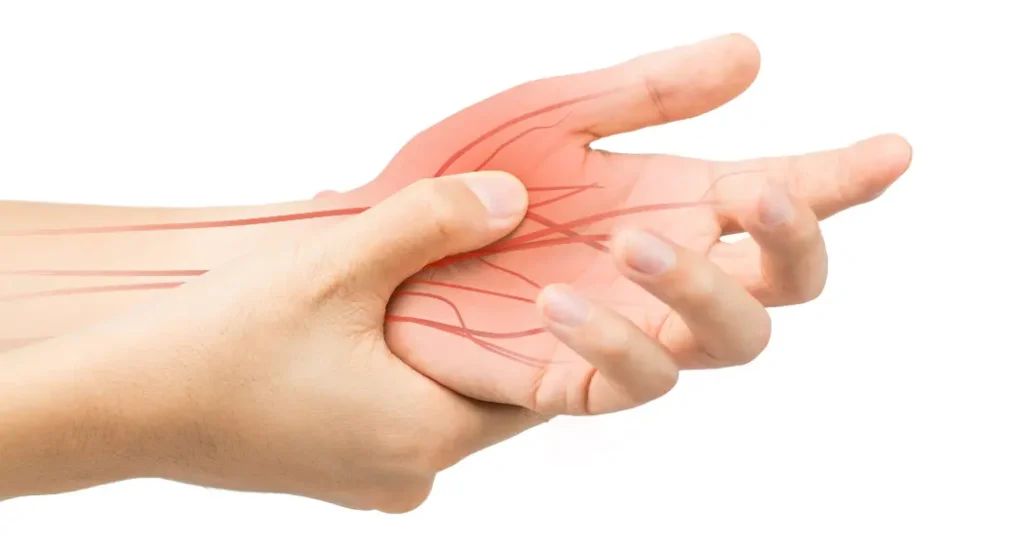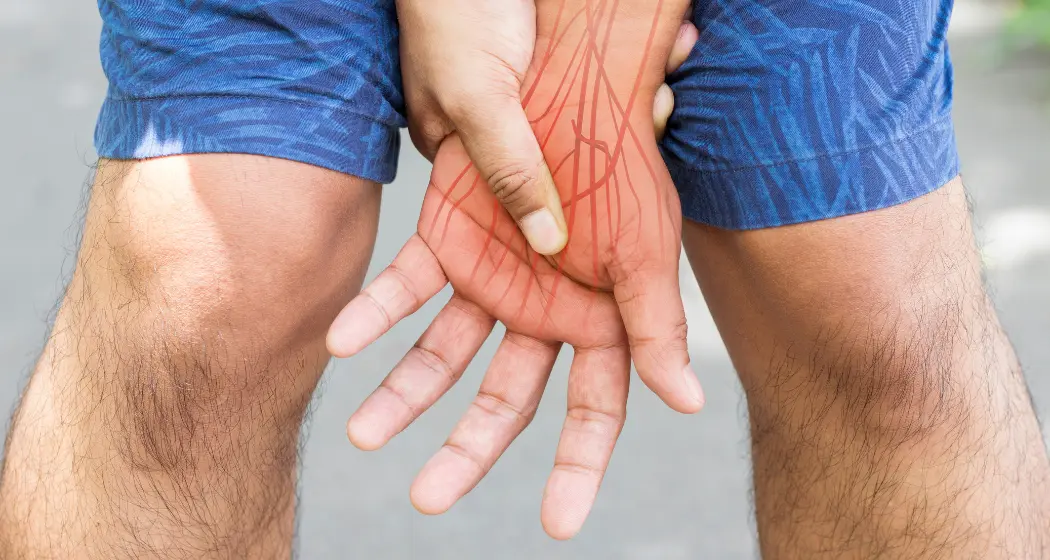Peripheral neuropathy can be a challenging condition affecting many people globally. Nerve damage brings about various symptoms like pain, numbness, and weakness in the extremities. Understanding the causes and managing peripheral neuropathy is vital in preventing further damage and improving your quality of life. We’ll also talk about preventive measures that can lower the risk of developing nerve damage, especially if you are in the early “neuropathy stages.” Additionally, it’s important to talk to a doctor or visit a neuropathy treatment center near you before attempting to diagnose or treat neuropathy on your own.
In this article, we’ll dive into the details of peripheral neuropathy, covering its causes, symptoms, and available treatment options. Whether you’re personally experiencing the initial signs of peripheral neuropathy or gathering information for a loved one, this article offers valuable insights. Empower your health by grasping the underlying causes and adopting proactive measures to potentially prevent or effectively manage peripheral neuropathy.
Join us as we explore the world of peripheral neuropathy and empower ourselves with knowledge and strategies for maintaining optimal nerve health. Let’s uncover the truths about this condition and learn how to minimize its impact on our lives, possibly with the help of a dedicated “neuropathy treatment center.”
Causes and risk factors of peripheral neuropathy

Peripheral neuropathy can have various causes and risk factors. Over time, elevated blood sugar levels can harm nerves, resulting in the development of peripheral neuropathy. However, time elevated blood sugar can harm nerves, resulting in peripheral neuropathy. Conditions like kidney problems, liver issues, and autoimmune disorders can also harm your nerves.
Certain medications, including chemotherapy drugs, can cause peripheral neuropathy as a side effect. Moreover, contact with harmful substances like heavy metals or specific chemicals can harm nerves, causing peripheral neuropathy. Genetics may also play a role in the development of peripheral neuropathy. Some people may have an inherited predisposition to nerve damage, making them more susceptible to developing the condition.
It is important to note that while these factors increase the risk of peripheral neuropathy, having these risk factors doesn’t guarantee that everyone will develop the condition. Knowing why it happens and the things that increase the chances can guide choices and prompt medical care. Check peripheral neuropathy symptoms.
Symptoms of peripheral neuropathy
Peripheral neuropathy shows different symptoms based on the specific nerves it affects. Common symptoms include tingling, numbness, and a burning sensation in the hands, feet, or other areas of the body. Some individuals may experience sharp, shooting pain or cramps in the affected areas. Weakness and muscle atrophy can also occur as a result of nerve damage.
This might make it harder to stay balanced and coordinated, making everyday tasks more challenging. In certain situations, peripheral neuropathy may impact the nerves that handle automatic tasks like heart rate, blood pressure, and digestion. This may cause dizziness, fainting, or digestion problems. Pay attention and get medical advice if these symptoms persist or worsen. Spotting and addressing the issue early can stop more harm and increase the odds of successful treatment.
Diagnosis and tests for peripheral neuropathy
If you suspect you may have peripheral neuropathy, it is important to consult a healthcare professional for a proper diagnosis. They’ll check your health history, do a physical exam, and might suggest extra tests to find out why your nerves are damaged. One common test used to diagnose peripheral neuropathy is electromyography (EMG). This test checks how muscles use electricity and how fast nerves send signals.
Nerve conduction studies (NCS) may also be conducted to assess the health and function of the peripheral nerves. Blood tests can help find hidden health issues like diabetes or low vitamins that might be causing peripheral neuropathy. At times, physicians may recommend scans like MRI or CT to examine structures or nerve pressure.
A thorough checkup from a healthcare pro can figure out what’s causing peripheral neuropathy and suggest the right treatment. At Waters Edge Medical Clinic we perform a free consultation and evaluation. During that time we will not only perform a very thorough history, which helps guide us to establishing why you have gotten neuropathy, but we will also evaluate the nerves, muscles and tendons. With this evaluation we also include thermal images which gives us further insight into the function of your nerves and tissues.
Prevention and lifestyle changes to manage peripheral neuropathy
Though not all peripheral neuropathy can be avoided, Individuals can reduce the chance of nerve damage by taking preventive measures. Taking care of health issues like diabetes is vital to prevent or slow down the progress of peripheral neuropathy. Living well supports your nerves. A good diet, exercise, and healthy habits promote optimal nerve health. Nourish with a balanced diet, exercise for circulation, and moderate alcohol to maintain healthy nerves.
Protecting the extremities from injury is another important aspect of preventing peripheral neuropathy. Wearing protective footwear, using padded gloves when handling tools, and being mindful of repetitive movements or pressure on the limbs can help minimize the risk of nerve damage. Regular checkups with healthcare pros to watch blood sugar, cholesterol, and other health signs can help spot and treat issues early. By changing your lifestyle and being proactive, you can actively control the chance of getting peripheral neuropathy and keep your nerves healthy.
Medications and treatments for peripheral neuropathy
When it comes to treating peripheral neuropathy, healthcare professionals may recommend different approaches depending on the underlying cause and severity of the condition. Doctors commonly give medicines to control symptoms and bring relief. Ease discomfort with pain relievers—either over-the-counter or prescribed—as part of your treatment. In some cases, antidepressants or anticonvulsant medications can also help reduce nerve pain. However, medications should only be used for a short period of time, due to the underlying side effects and damage that can occur from long term use.
It is vital to get further physical and corrective care to help limit the usage of harsh medications. Addressing the underlying condition or risk factor is crucial for managing peripheral neuropathy. If diabetes is the culprit, managing blood sugar with meds, diet, and lifestyle changes can prevent more nerve damage. Physical therapy and occupational therapy are crucial for handling specific symptoms of peripheral neuropathy.
These therapies focus on improving strength, balance, and coordination, as well as teaching individuals learn how to adjust to your situation and do daily tasks more efficiently. In severe instances, surgery might be needed to fix nerve compression or structural issues causing peripheral neuropathy. Work with healthcare experts to craft a treatment plan just for you, addressing your specific needs and circumstances.
Alternative therapies for peripheral neuropathy
Alongside regular treatments, some people might try different therapies to handle peripheral neuropathy. Though not scientifically proven to cure the main issue, these therapies can enhance symptoms and well-being. Acupuncture, an alternative therapy, has demonstrated promise in relieving nerve pain and enhancing nerve function.
This traditional Chinese method inserts thin needles at specific body points to stimulate energy flow. Massage therapy can also provide relief by improving blood circulation and reducing muscle tension. Approaches like myofascial release and lymphatic drainage can focus on particular areas impacted by peripheral neuropathy.
Boost nerve health with supplements like alpha-lipoic acid, vitamin B12, and omega-3 fatty acids. Before trying new supplements or treatments, consult a healthcare pro to ensure they’re safe and suitable for your specific needs. While alternative therapies can complement conventional treatments, it is essential to remember that they should not replace medical advice or prescribed treatments.
Support and resources for individuals with peripheral neuropathy
Living with peripheral neuropathy can be challenging, both physically and emotionally. It’s vital for individuals to seek support and connect with resources to help them on their journey. Joining support groups, whether in-person or online, offers a safe place to share, learn, and receive emotional support from others. Joining these groups lets individuals connect with others who share their challenges, providing valuable insights and coping strategies.
Various organizations and foundations dedicated to peripheral neuropathy provide educational materials, resources, and assistance to individuals and their families. These organizations can help individuals access relevant information, find healthcare professionals specializing in peripheral neuropathy, and connect with research studies or clinical trials.
Healthcare professionals, including neurologists or pain management specialists, can also provide guidance and support throughout the treatment process, especially at a reputable “neuropathy treatment center,” Like Waters Edge Medical Clinic and Spa. They can address questions, monitor progress, and adjust treatment plans as needed.
Remember, you are not alone in your journey with peripheral neuropathy. Reach out and take advantage of the available support and resources, including those at a dedicated “neuropathy treatment center,” to empower yourself and enhance your quality of life.
Coping strategies for living with peripheral neuropathy
Living with peripheral neuropathy requires adapting to new challenges and finding effective coping strategies. Here are tips to help individuals handle their situation and enhance their overall well-being:
Living with peripheral neuropathy involves navigating through different “neuropathy stages” and adapting to new challenges. Here are some tips to help individuals manage their condition and improve their overall well-being:
- Manage stress with techniques like deep breathing and meditation, or yoga. Stress can exacerbate nerve pain, so finding ways to relax and reduce stress levels is beneficial, especially in later “neuropathy stages.”
- Stay active with regular walks, swimming, or low-impact exercises. Exercise boosts circulation, reduces pain, and enhances overall health, crucial at different “neuropathy stages.”
- Consume a diverse and healthy diet, incorporating a variety of nutritious foods for overall well-being. Maintain nerve health and well-being by eating a balanced diet rich in essential nutrients.
- Take breaks and rest when needed. Pay attention to your body, avoid overexertion to prevent worsening symptoms, and aid healing—an important aspect in handling “neuropathy stages.”
- Support weakened muscles or enhance balance with assistive devices like braces or orthotics. These devices can help individuals maintain independence and perform daily activities with greater ease, especially in advanced “neuropathy stages.”
- Stay connected with friends, family, and support networks. Social support can provide emotional comfort, encouragement, and a sense of belonging.
- Explore professional counseling or therapy to address emotional and psychological challenges linked to living with peripheral neuropathy.
By implementing these coping strategies and prioritizing self-care, individuals can enhance their overall well-being and better manage the impact of peripheral neuropathy on their daily lives.
Neuropathy Stages FAQs
We’ve collected common questions to help you understand neuropathy, its types, stages, and treatments, including stage 4 neuropathy, so you can improve your life.
Can neuropathy be treated as early as possible in each stage of neuropathy?
Yes, treating neuropathy early in each stage can help manage symptoms and slow down how fast it gets worse. Neuropathy treatments can help control symptoms, might include medications, exercises, or lifestyle changes, and slow down how fast the disease gets worse. Sometimes, neuropathy can get better by itself, but it depends on what’s causing it and how bad it is. The key is to see a doctor or visit a neuropathy treatment center near you as soon as you notice symptoms, like tingling or numbness in your hands or feet.
How do doctors find out if someone has neuropathy?
Doctors use different methods to find out if someone has neuropathy. They start by asking questions about symptoms, like numbness or tingling in the hands or feet. Then, they might check the body, especially the affected areas, for signs of nerve damage. Doctors also look at a person’s medical history to see if there are any underlying conditions that could be causing the neuropathy.
In addition to these steps, doctors often perform specialized tests to confirm a diagnosis of neuropathy. These tests can include nerve conduction studies and electromyography (EMG), which measure how well nerves are working and how muscles respond to nerve signals. Blood tests and imaging scans may also be used to rule out other possible causes of symptoms.
Diagnosing neuropathy involves a combination of asking questions, examining the body, and using specialized tests to determine the extent and cause of nerve damage.
Are there different kinds of neuropathy?
Yes, there are different types of neuropathy. Neuropathy can happen in different parts of the body and for different reasons.
Some common types include:
Diabetic Neuropathy
- When your blood sugar levels are too high, it can hurt the nerves all over your body. Diabetes can harm different parts of your nervous system, including the nerves that control things like your heart rate and digestion, the ones that help you move, and those that let you feel things.
Alcohol Neuropathy
- It’s when drinking too much alcohol for a long time damages your nerves. People usually find out they have it when they’re between 40 and 60 years old. This damages the nerves outside the brain and spine, which can make your hands and feet hurt, tingle, feel numb, or get weak.
Peripheral Neuropathy
- It’s the most usual kind of neuropathy, and it affects the nerves outside the brain and spine. It can make any part of your body with nerves feel strange, like your feet, legs, hands, arms, or even organs like your heart or tummy.
Autonomic Neuropathy
- These kinds of nerve problems happen in certain nerves or groups of nerves anywhere in the body. They’re often from one-time injuries to a nerve, like in carpal tunnel syndrome. But they can also happen because of swelling, diseases that affect nerve cells, or tumors.
Hereditary Neuropathy
- This disorder comes from changes in genes that get passed from parents to children. Scientists have found over 80 different nerve disorders caused by these gene changes.
Focal Neuropathy
- These kinds of nerve problems happen in certain nerves or groups of nerves in any part of the body. They’re often caused by an injury to one nerve, like in carpal tunnel syndrome. But they can also happen because of swelling, diseases that affect nerve cells, or tumors.
Each type of neuropathy can cause different symptoms and may require different treatments. It’s important for doctors to determine the specific type of neuropathy a person has in order to provide the most effective care.
What are the different stages of neuropathy?
Yes, neuropathy is divided based on how bad your symptoms are. It’s important to remember that not everyone will go through all the stages of neuropathy.
Neuropathy progresses through various stages, each characterized by different levels of symptom severity and nerve damage. In the early neuropathy stages, individuals may experience mild symptoms such as occasional tingling or numbness in the hands or feet.
As neuropathy advances, symptoms can worsen, leading to persistent pain, burning sensations, muscle weakness, and difficulty with coordination and balance. In the later stages, especially in Stage 4 of Neuropathy, nerve damage may become extensive, resulting in severe and debilitating symptoms that significantly impact daily functioning and quality of life.
It’s essential for individuals experiencing symptoms of neuropathy to seek medical attention or visit a neuropathy treatment center promptly. This allows for the determination of the stages of their condition and the receipt of appropriate treatment to manage symptoms and slow disease progression
1st Stage: Early Symptoms (Occasional discomfort involving both pain and numbness)
- In the early neuropathy stages, even though there aren’t any symptoms yet, the nerves are already getting damaged. Usually, doctors find out about this damage by checking the body and doing tests like nerve conduction studies on the nerves.
2nd Stage: Worsening Symptoms (Persistent discomfort)
- Mild neuropathy starts with feelings of numbness or tingling in the feet or hands, along with a bit of pain and weakness in those areas. Even though these symptoms can be upsetting, they usually don’t affect your daily activities much.
3rd Stage: Moderate Neuropathy (Peak discomfort)
- In moderate neuropathy, symptoms get stronger and start to affect daily life more. People might feel a lot of pain in their limbs, have weak muscles, move less easily, and find tasks like buttoning a shirt or holding things tight tricky.
4th Stage: Advanced Neuropathy (Numbness begins to take hold)
- In stage 4 neuropathy, symptoms get really bad for patients. They might have very bad pain that regular medicine can’t help, or struggle to do simple tasks because their muscles are very weak or they can’t feel their arms or legs well. Sometimes, doctors might need to do surgery to help manage these symptoms
5th stage: Severe Neuropathy (Complications)
- In stage 5, there could be problems, showing how important it is to take good care of neuropathy. It’s really important to talk to doctors who know a lot about neuropathy, like the ones at Water’s Edge Medical Clinic and Spa in St. Petersburg, Florida. They can help come up with plans to make the bad symptoms better and stop things from getting worse. It’s really important to act fast and get help early in this stage to give the best care and help to people dealing with severe neuropathy.
Water’s Edge Medical Clinic and Spa in St. Petersburg, Florida, is renowned for its excellence in neuropathy treatment. With a team of highly skilled healthcare professionals specializing in neuropathy care, state-of-the-art facilities, and a comprehensive approach to treatment, patients receive top-notch care tailored to their individual needs. From advanced diagnostic testing to innovative treatment modalities, including regenerative medicine, red light therapy, soft wave therapy and treatments.
Waters Edge Medical Clinic offers a range of services to effectively manage neuropathic symptoms and improve quality of life. With a commitment to patient satisfaction and holistic wellness, Water’s Edge Medical Clinic and Spa stands out as a premier destination for neuropathy treatment in Florida
What are some usual ways to treat nerve pain from neuropathy?
There are several ways to help with nerve pain from neuropathy. Neuropathy treatment in Florida might suggest medicines like pain relievers, anti-seizure drugs, or antidepressants to manage the pain. Physical therapy or exercises can also be helpful to control balance issues or weak muscles. Some people find relief from alternative treatments like acupuncture or herbal supplements. It’s essential to talk to a doctor or visit a neuropathy treatment center to find the best treatment plan for each person’s needs.
What are things I can do to prevent neuropathy?
There are some things you can do to lower your chances of getting neuropathy. One important thing is to take good care of your health, especially if you have conditions like diabetes or high blood pressure. This means keeping your blood sugar levels in check, eating healthy foods, and staying active with regular exercise. Avoiding smoking and limiting alcohol intake can also help protect your nerves.
Lastly, be sure to protect your body from injuries that could damage your nerves, like wearing proper footwear and avoiding repetitive motions that strain your body. Eating foods that can ease nerve pain is important too. These include an anti-inflammatory diet which usually emphasizes things like lean meats, such as fish and chicken, lots of vegetables and fruits, whole grains, and nuts.
Is it possible to have a normal life even with neuropathy?
Yes, Living with neuropathy can be challenging, but many people can still live fulfilling lives with proper management. It’s important to work closely with your healthcare team, including specialists at a neuropathy treatment center, to develop a treatment plan that addresses your symptoms and helps you maintain a good quality of life. Waters Edge medical Clinic and Spa specializes with this type of treatment and helps patients handle and even eliminate their neuropathy symptoms.
This may include medications, physical therapy, lifestyle changes, and support from friends and family. While neuropathy may require adjustments, it’s possible to find ways to cope and enjoy life despite the condition.
Conclusion: Taking control of your peripheral neuropathy
Peripheral neuropathy is a complicated condition that can really affect how you live. If you understand why it happens, what signs to look for, and what treatments are available, you can take control and try to stop more nerve damage. Doing things like managing other health problems, changing your lifestyle, and keeping your hands and feet safe can lower the chance of getting peripheral neuropathy.

Finding out about it early, getting the right treatment, and checking for “neuropathy treatment center” like Waters Edge Medical clinic and Spa can really help manage the condition and make the symptoms better. Talking to doctors, joining groups, and using resources around you can give you good advice, support, and help with your feelings about dealing with peripheral neuropathy.
Also, finding ways to deal with it and taking care of yourself can make you feel better and handle the challenges that come with the condition. Remember, you’re not alone. With what you know, the help you get, and things you do early, you can take control of peripheral neuropathy and live a good life.
If you are suffering with neuropathy or think that you might have neuropathy, feel free to contact Waters Edge medical Clinic and spa and schedule your free consultation and evaluation with us. You can contact us directly via phone 727-550-0855 or through our website at www.watersedgemedicalclinic.com

